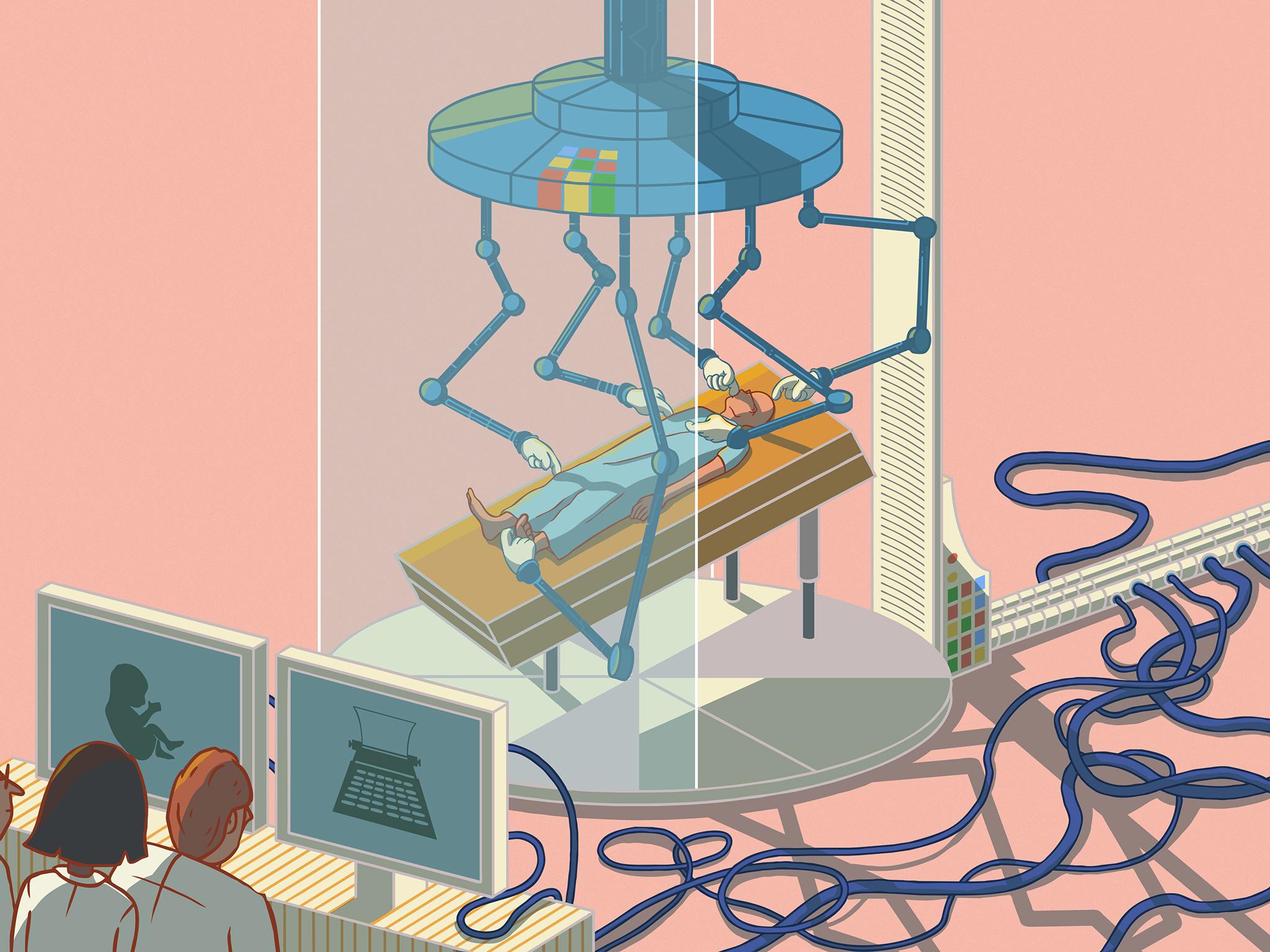Can ‘tapping’ my chin and eyebrows break my writer’s block?
As she is cast back to her early childhood, Christine Manby discovers that the ‘emotional freedom technique’ is revealing more about her creative slowdown than she bargained for


The first time I met Tamara Pitelen, in the shadow of the standing stones at Avebury, I knew I liked her. Which is fortunate, because the second time I met Tamara Pitelen, we just had time to share a cup of tea before she started drumming her fingers on my face. But Pitelen was not just randomly rapping on my body. She’s a practitioner of the Emotional Freedom Technique (EFT) – more commonly known as “tapping” – a healing methodology combining principles from Chinese medicine, acupuncture and kinesiology.
According to thetappingsolution.com, the first recorded instance of tapping hails from 1980, when psychologist Roger Callahan decided to take a new approach with a client, Mary, who had such a severe phobia of water she could not even bear to see a swimming pool on television. After a year of therapy, Mary still found that being near water sparked intense stomach pains.
Dr Callahan had recently been introduced to the concept of meridians in Chinese medicine. Meridians are a network of channels along which “chi”, the body’s energy, moves. Traditional Chinese medicine refers to 100 meridian points which, when stimulated, can catalyse healing. Callahan recalled that the stomach meridian has a corresponding acupuncture point on the cheekbone so when Mary next experienced stomach pains in the proximity of water, he asked her to tap on that point. To both Callahan and Mary’s surprise, her stomach pains disappeared. Not only that, after using the technique on several occasions, she discovered she was no longer phobic.
Over time, Callahan’s discovery was harnessed to become tapping as it is practised today: a simple sequence of points to tap, for all types of issues. The Tapping Solution explains: “All negative emotions are felt through a disruption of the body’s energy. And physical pain and disease are intricately connected to negative emotions … Restore balance to the body’s energy, and you will mend the negative emotions and physical symptoms that stem from the energy disruption. Tapping restores the body’s energy balance, and negative emotions are conquered.”
During a typical tapping session, the client focuses on the issue they wish to explore, while the practitioner taps in sequence on 12 meridian points – including a spot on the side of the hand, one above the eyebrow and one on the chin – and recites phrases designed to break through to the real issue at hand, which the client repeats.
Pitelen began my EFT session by asking me to come up with an issue I’d like to clear. Pitelen’s clients come to her for all sorts of reasons but she’s had particular success with helping people clear the unconscious blocks that are preventing them from losing weight. She outlines how her tapping method can help with this in her book How To Heal Your Weight. I’m carrying a couple of excess pounds, for sure, but I decided to ask Pitelen if she could help me remove that most notorious of mental blocks – the writer’s block – instead.
I’d been faffing around with the synopsis for a new novel since September. The deadline for the finished book is May. I knew what I wanted the book to be. I knew where the story should begin and end. I knew all the characters – at least by sight – but somehow I couldn’t settle down to the writing of it.
I’ve written more than 40 books since I published my first novel in 1995. Each one has followed more or less the same pattern of writing. I no longer think the world is about to end when, 30,000 words in, I realise that I have to scrap the whole thing and start again. But I’d never before experienced a situation where I couldn’t even get to the end of the first three crappy chapters. Why did this particular book feel so much harder than the rest?
We started out simply. While Pitelen tapped a spot above my eyebrow, she asked me to repeat a phrase which she had pulled out of my own words. “Even though I am worried I don’t have what it takes to write this novel, I love and accept myself.” She moved on to a meridian point on my chin and we repeated the process again. At various moments, she asked me to rate, on a scale of one to 10, how true the phrase I was saying was feeling now. As Pitelen tapped, she introduced subtle changes to the phrase and often stopped to ask questions. Why did not being able to write my novel feel so bad? There were moments when the words that popped out of my mouth were genuinely unexpected. I found myself saying that this novel felt “like the last roll of the dice” and if it didn’t work out I didn’t know what I would do next.
Since my single EFT session, I’ve felt more carefree. That’s the only way to describe it. And when I’ve felt the worries that were queueing up gathering at my shoulder again, I’ve tapped them away
Other people’s therapy revelations are rarely interesting, so I’ll make this short. I started out talking about my writer’s block and ended up talking about the brief period of time I spent in foster care as an infant. I was tiny. I don’t “remember” those few weeks at all, and yet they’ve shaped my life. Not knowing where and with whom I spent that time when I was so vulnerable instilled in me a sense of the precariousness of life that I just can’t shake. As a result, I’ve grown into a rabidly independent control freak of an adult.
By the end of the tapping session, I felt I’d found the tiny seed at the heart of my writing problem. I’d given myself writer’s block to put off the moment when someone else – my editor – had control of the work that, to my mind, would either see a resurgence of my fiction career or end it. The prospect of a lack of money, prestige and control if it went badly all tapped into my infantile fear of being at the mercy of strangers again.
I had not expected to go back so far. I asked Pitelen if what had happened during our session was typical. She assured me that it was. She gave the example of a client unable to lose weight, despite trying every diet under the sun, realising that she was clinging onto the extra pounds to make herself less visible to the type of man who had abused her as a child.
So how does EFT work? One study by the Harvard Medical School discovered that the body’s fear response, which originates in the amygdala, could be controlled by stimulating the traditional meridian points used in acupuncture and acupressure. Tapping stimulates the same points so it’s not too much of a stretch to assume it works in the same way.
Meanwhile, Dawson Church, founder of The Stress Project, which offers tapping to military veterans suffering from PTSD, undertook a study of 83 subjects to see how a single hour-long tapping session would affect their stress levels. Church and his team discovered that, on average, the subjects experienced a reduction in the stress hormone cortisol of 23 per cent. A control sample of subjects who received talk therapy experienced no such reduction. Tapping could also be working via distraction or because it incorporates elements of mindful breathing techniques. Or perhaps the success of tapping depends on the practitioner. Pitelen has an aura of calm and pure kindness and is an expert at drawing out the hidden unhelpful thoughts that are really keeping someone stuck. Maybe an hour’s conversation with her would have had the same effect.
There’s much research still to be done but tapping did seem to work for me in a way that meditation and breathing exercises hadn’t. A couple of days later, I sat down at my desk and bashed out 3,000 words in one sitting. The elusive voice of my narrator finally started to come through. Plot points and flourishes started to fall into place. Sure, when the book is finished, my ability to influence its sales and the subsequent fate of my career will be minimal but I find I care a little less. I’m no longer the infant with no choices at all. Everything will be alright.
Since my single EFT session, I’ve felt more carefree. That’s the only way to describe it. And when I’ve felt the worries that were queueing up gathering at my shoulder again, I’ve tapped them away. I’ve also tapped away the flash of adrenalin that comes with encountering all the usual big city rudeness. I’ve secretly tapped my way through difficult phone calls. I tapped back the tears at a funeral. A few days after I saw Pitelen, I emailed my friend Jane in Denver about the experience and she reminded me that she’d tried tapping too, back in the Noughties when she was separating from her first husband. “LOVE IT!” Jane wrote. “It got me over my marriage and helped me to become someone who had a chance of finding another relationship… Plus it allowed me to break up with my mom instead of continuing to go back for more abuse. It’s so freeing and gentle.”
So, while no one really knows how it works, it seems that for some people tapping really does work. It’s worth a try. Though I have no doubt that Pitelen was a major factor in the effectiveness of tapping for me, you can teach yourself. There are plenty of videos online. It’s free. It requires no equipment. It has no side effects. Though you might want to tap the side of your hand rather than the eyebrow meridian point when you’re soothing yourself after being cut up in traffic. Especially if the person who cut you up still has you in their rear-view mirror.
Join our commenting forum
Join thought-provoking conversations, follow other Independent readers and see their replies
Comments